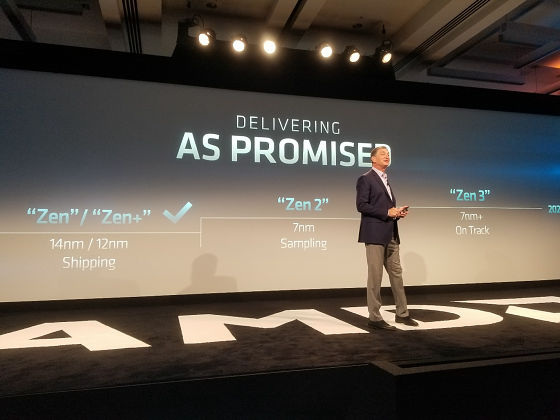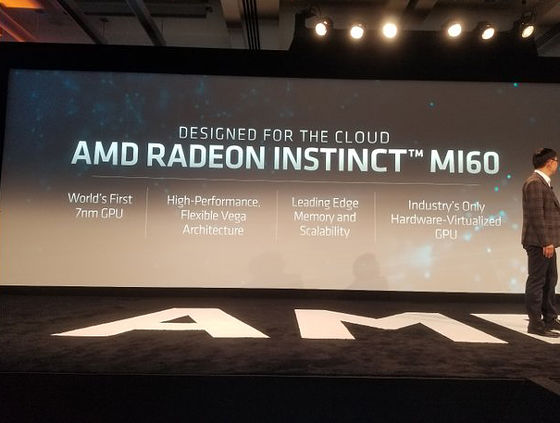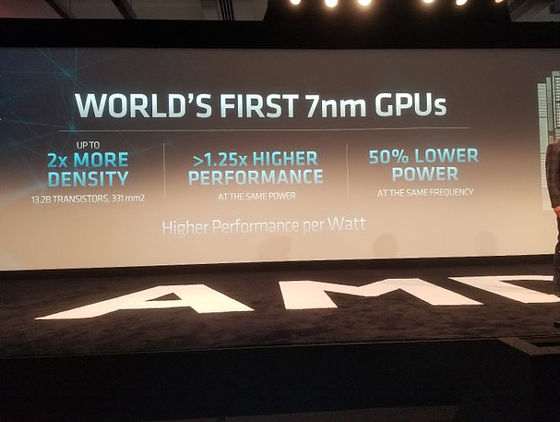AMD announces 7 nm process - CPU 'Rome' for data center of up to 64 cores and 7 nm process GPU 'MI 60'

AMD announced the outline of next generation CPU and GPU at the next-generation technology conference " Next Horizon " held in San Francisco. The 7 nm process "ZEN 2" base CPU " Rome " will be shipped in 2019, and the 7 nm process GPU " Radeon Instinct MI 60 " will be shipped in the fourth quarter of 2018.
AMD Announces 64-Core 7 nm Rome CPUs, 7 nm MI 60 GPUs, And Zen 4
https://www.tomshardware.com/news/amd-new-horizon-7nm-cpu,38029.html
The important point in this announcement is that "the marketing of CPUs and GPUs manufactured in the 7 nm process is imminent". With Intel's difficulties in manufacturing the 10 nm process , AMD will be able to establish its advantage over Intel for the first time by establishing production of the 7 nm process as soon as possible.
Lisa Su, the keynote speaker at the event, AMD unveiled its commitment to the data center market with products of the next 7 nm process. In the future, AMD will be represented by the "EPYC" series in situations where the increase in workload demanded of data centers in areas such as high performance computing (HPC), cloud, hyperscale, and virtualization environments is ensured We are striving to focus on the CPU field for data center. AMD estimates the market size for the data center until 2021 to be about 29 billion dollars (about 3.3 trillion yen), and furthermore it is a policy to provide GPU to AI and machine learning fields.

The event announced that Amazon Web Services (AWS) will now offer a new EPYC compliant cloud instance. AWS has started offering general-purpose "M5a" as the instance type with EPYC and "R5a" memory optimization, and plans to start offering "T3a" in the future. An instance using EPYC has the advantage that the cost is suppressed by 10% over other cloud instances of AWS.

In the Rome processor, the CPU core is one socket and a maximum of 64 cores, 128 threads, the number of cores is twice the Epyc. Furthermore, in the ZEN 2, the microarchitecture of the CPU core has been improved, and in floating-point SIMD (Single Instruction, Multiple Data) operation, the floating-point operation is expanded from the current 128-bit width to 256-bit width, Peak performance per doubled, and power consumption will be cut by half.

AMD has already performed sampling of the 7-nm process "Rome" processor, and it is planned to be introduced to the market in 2019. In addition, the development of "Zen 3" processors manufactured by 7 nm + process is proceeding, and a road map leading to the "Zen 4" microarchitecture has been revealed although the details have been hidden.

In the event, GPU "Radeon Instinct MI 60" manufactured in the world's first 7 nm process was announced. A small GPU with only about 13.3 billion transistors installed and only 331 square millimeters is based on the "Vega" architecture and is the first PCIe 4.0 GPU for commercial use. In addition, a new fabric called "Infinity Fabric" which redesigned the interconnect fabric inside and outside the chip realized a memory bandwidth of 1 TB / s. The MI 60 shows up to 7.4 TFLOPS for FP64 and up to 14.7 TFLOPS for FP32.


AMD also posted a GPU roadmap leading to "MI - NEXT" next to MI 60. Technical details and timing of introduction of the market etc are not disclosed at all.

Related Posts:
in Hardware, Posted by darkhorse_log







